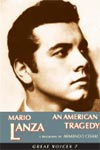- Reviews
Mario Lanza - An American Tragedy
By Armando Cesari
-
-

-
-
- By Lawrence Galante, PhD, DHom
Associate Professor SUNY
-
- The definitive book about the legendary tenor Mario Lanza,
has been written. Anyone wanting to understand the successes and torments
of the life of this American icon must read Armando Cesari,s excellent
biography. An expert on opera, Mr. Cesari quotes extensively the views
of many operatic personalities about opera in general and on Mario Lanza
in particular. Beginning in the introduction, Mr. Cesari clearly states
the dilemma of Mario Lanza's career; namely that, although he made numerous
operatic recordings, he never sang opera at a major opera house and therefore
was never regarded as a serious opera singer. Yet more than forty years
after his death, this singer who probably did more to popularize opera
than anyone before him, is still selling more opera recordings than most
of the opera singers of his generation and, for that matter, of other generations
as well. So, how is this explained? In his preface to the book, Placido
Domingo points out that Mario Lanza's name does not even appear in Grove's
Dictionary of Music and Musicians, he adds "The voice communicated
to millions all over the world" and "did more to lure the general
public to the art forms of operatic singing than the voice of almost any
other performer before his time." And as Cesari mentions, Lanza's
voice inspired such operatic notables as Di Stefano, Corelli, Carreras,
Domingo, Pavarotti, Leech, Hadley, Alagna, Vargas, Bocelli, Hvorostovski,
Nucci, and Gheorghiu.
-
- Mario Lanza possessed a voice of such beauty, such power,
such thrilling high notes, and such passionate phrasing that three generations
of music lovers were captivated. Lanza, of course, was the first really
successful crossover classical tenor, who not only held top positions on
the popular radio charts with such releases as Be My Love and Because Your
Mine, but also sustained RCA's classical record division with his popularity.
Lanza was a recording phenomenon.
-
- But what emerges in this book is the ongoing conflict
between his commercial success and his artistic integrity. The worlds of
opera, radio, television, and movies were all vying for his voice. Hollywood
won out and the opera world lost out. Lanza was a sensitive artist who
cared deeply about the quality of everything he did and who dared to stand
up and challenge Hollywood for placing him in 'B movies' with inane scripts,
and singing situations.
-
- Unfortunately, Hollywood at that time was a place where
actors were expected to do as they were told and not to question their
producers or directors. Can we imagine Maria Callas or Franco Corelli being
told that they are "singing with too much passion"? That's what
Lanza was told and he did exactly what any great artist would do. He protested
and refused to compromise his singing.
-
- But this noble (or prideful) act of his escalated into
one of the most monumental battles in Hollywood's history, resulting in
a lawsuit that would devastate this great talent and leave him without
the possibility of work, in debt, and psychologically devastated. He turned
to alcohol and overeating to compensate for his deep emotional frustration.
Lanza became a broken man who lost his confidence and withdrew from the
public, never to fulfill his life-long ambition to become the world's greatest
dramatic tenor singing at La Scala and Metropolitan Opera.
-
- The intimate details of this tragic transformation from
a cock sure youthful singing sensation into the broken, alcoholic, self-loathing
shadow of his former self is brilliantly retold in Mr. Cesari's excellent
biography. The author leaves us with the never to be answered questions,
which where no doubt the questions that Lanza must have asked himself thousands
of times: Was it a mistake to make movies? Was it wrong to make millions
of people appreciate opera, instead of singing to a few thousand opera
lovers? Was it wrong to earn four to six thousand dollars a night singing
a private concert instead of earning one thousand dollars a night singing
at the Metropolitan or La Scala?
-
- Armando Cesari's book is a must read for any fan of great
singing, of opera, or of Mario Lanza.
-
- Lawrence Galante, PhD, DHom
- Associate Professor SUNY
- 212 414-1266
|